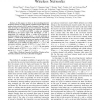Free Online Productivity Tools
i2Speak
i2Symbol
i2OCR
iTex2Img
iWeb2Print
iWeb2Shot
i2Type
iPdf2Split
iPdf2Merge
i2Bopomofo
i2Arabic
i2Style
i2Image
i2PDF
iLatex2Rtf
Sci2ools
113
click to vote
INFOCOM
2009
IEEE
2009
IEEE
Scaling Laws on Multicast Capacity of Large Scale Wireless Networks
—In this paper, we focus on the networking-theoretic multicast capacity for both random extended networks (REN) and random dense networks (RDN) under Gaussian Channel model, when all nodes are individually power-constrained. During the transmission, the power decays along path with the attenuation exponent α > 2. In REN and RDN, n nodes are randomly distributed in the square region with side-length √ n and 1, respectively. We randomly choose ns nodes as the sources of multicast sessions, and for each source v, we pick uniformly at random nd nodes as the destination nodes. Based on percolation theory, we propose multicast schemes and analyze the achievable throughput by considering all possible values of ns and nd. As a special case of our results, we show that for ns = Θ(n), the per-session multicast capacity of RDN is Θ( 1 √ ndn ) when nd = O( n (log n)3 ) and is Θ( 1 n ) when nd = Ω( n log n ); the per-session multicast capacity of REN is Θ( 1 √ ndn ) when nd = O( n...
Communications | INFOCOM 2009 | Multicast Capacity | Networking-theoretic Multicast Capacity | Per-session Multicast Capacity |
Related Content
| Added | 24 May 2010 |
| Updated | 24 May 2010 |
| Type | Conference |
| Year | 2009 |
| Where | INFOCOM |
| Authors | Cheng Wang, Xiang-Yang Li, Changjun Jiang, ShaoJie Tang, Yunhao Liu, Jizhong Zhao |
Comments (0)

